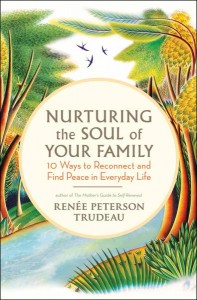GUEST BLOG POST: Finding and Building Your Tribe by Renee Peterson Trudeau, author, Nurturing the Soul of Your Family
 I’m passionate about fostering connection and creating intentional community for myself, my family, and others. I’m involved in so many groups that when I’m headed out the door to an evening or weekend gathering, my husband likes to joke, “Which women’s circle, girlfriend gathering, or retreat are you going to or leading today?” My husband has learned to find his tribe, too, participating in a weekly drumming group — for over seven years — and attending an annual men’s spirituality retreat.
I’m passionate about fostering connection and creating intentional community for myself, my family, and others. I’m involved in so many groups that when I’m headed out the door to an evening or weekend gathering, my husband likes to joke, “Which women’s circle, girlfriend gathering, or retreat are you going to or leading today?” My husband has learned to find his tribe, too, participating in a weekly drumming group — for over seven years — and attending an annual men’s spirituality retreat.
Building your tribe takes work, however. It’s a skill that we have to learn. And as I travel around the globe, I frequently hear the question “How do you create community?” A female executive at a large Fortune 500 company came up to me at the end of a “build your support network” presentation in Philadelphia. She had tears in her eyes. She said that while she was in a book club, involved in her neighborhood, and occasionally attended women’s leadership discussion groups, what she sorely missed and craved most was real, authentic, meaningful dialogue with people who let her show up without her mask — makeup-free.
Finding such a community of people may be just a conversation away, but it requires us to let down our guard, be vulnerable, and open up to a new way of being with others. People everywhere have a growing desire to circle up and connect more deeply around matters of the heart. It’s how we’re supposed to be, and when you experience this, there’s no turning back. Before you can find or build that community for yourself, however, you must cultivate the mindset and desire to make this a priority; you set your intention for how you want to interact with others before you ever take action.
Even during my busiest seasons at work, I’m always looking for meaningful ways to gather women; this is and always will be central to my life. In honor of what would have been my nonnie’s (my maternal grandmother) hundredth birthday, I gathered a small group of close friends to honor and celebrate the gifts we have received from our grandmothers — living and deceased. We each brought our grandmother’s favorite food, her photograph, and a physical object that represented one of our qualities that we attributed to her. After enjoying a meal together, we circled up and took turns drawing names from a basket and then bestowing these “gifts” upon each other. I received a circular seashell from my friend Amy, which represented her nana’s art of bringing people together — it was perfect.
Building and facilitating community is core to my being, and it’s radically transformed my life. Whether it’s reaching out to a mentor for support on a new project at work or emailing my meditation circle to ask them to send me good thoughts when I’m having an emotionally turbulent time, I now know that if I’m feeling alone — it’s my choice. And I can choose not to be.
Create a Personal Support System
Envision moving through your day and feeling totally supported in all areas of your life: around self, at work, at home, in your marriage and parenting, and in your volunteer and community activities. You don’t have to have all the answers; you’re not alone, and you have a robust team you can call on for help in all areas of your life.
Use the following exercise to create your new support network and get specific about what kind of support you need and want in the key areas of your life. Acknowledge those who are currently supporting you and think about your needs and what type of support you need to add.
On an oversize sheet of paper, draw a large circle and put a recent photograph of yourself in the middle. Using colored pens or pencils, divide the circle into four quadrants or categories; as in the table below, I suggest work and community (which can also encompass volunteer work), self, family and marriage (your key relationships), and household (which can include household maintenance, cleaning, cooking, and so on). Then, fill in each section with the names of people or positions (such as “career coach”) who could make up your ideal personal support system. Draw lines or “rays of support” radiating out from you toward the outer edge of the circle (like spokes on a wagon wheel) and write each name or position on the lines within the corresponding quadrant. (See the example below.)
Everyone’s support system will be unique. Include people you already know as well as people, organizations, and positions you need to find or get to know. Remember, this is about mapping out what you need to feel fully supported where you are right now!
Following is a list of individuals and resources you may consider including in your support network:
• professional and personal mentors
• professional development and networking organizations
• professional or skills-based teachers, instructors, or trainers
• work/life balance, business, or career coach
• professional peers and colleagues
• friends with kids
• friends without kids
• neighbors
• play groups, parenting support groups, and parenting coach
• single-parent or special-needs support groups (such as the Down Syndrome Association)
• babysitting and child care providers, such as daycare, nanny or sitting services, child care co-ops, co-working spaces offering childcare, and pediatricians
• social groups: creative or hobby groups, book clubs, and activities just for women or moms
• therapist, counselor, or support group
• spiritual mentors and communities
• financial consultants or advisers
• online support communities, forums, tele-classes, and so on
• family members
• meal co-ops and meal-delivery programs
• home care or repair, cleaning, and yard care services
• bodywork and health specialists, such as physicians, ob-gyns, chiropractors, acupuncturists, massage therapists, women’s health/hormone specialists, nutritionists and health coaches, physical therapists, and so on
As you create your support network, keep a few things in mind. This is meant to capture what you need to feel fully supported for your current life stage, needs, and family situation, but you, your family, and your support system will change. I recommend doing this exercise at the beginning of each quarter or at a minimum twice a year. Further, choose people you trust and admire for their experience and insight to be a part of your support system. Enlist the support of those whose lives reflect your own values and beliefs. Be selective. Don’t include people you feel you should simply because they are family or you’ve known them for a long time. In fact, if relationships are strained, it may even be unhealthy to try to enlist family members as part of your support network.
Don’t hold back — think in terms of your ideal. What type of and how much support do you really need to live, work, and parent optimally?
Finally, post this drawing where you will see it — maybe in your kitchen or home office, where it can remind you that help and support are only a phone call or email away. In fact, consider converting your support wheel into a list of phone numbers you can keep in your purse, by your computer, or on a bulletin board. It is often reassuring to have these names and numbers within arm’s reach. Share your new support network with your partner or a friend (and encourage them to create their own support wheel). Then, if you’ve identified support that you would like but don’t yet have, turn this into an action list: who can you call, or what groups can you start or create, to provide the support you need? (See “Putting It into Practice” below.)
When my son was small, I had a bulletin board in my kitchen with a picture of my family in the middle and an affirmation in large type at the top that read, “I Manage My Life with Ease and I Experience an Abundance of Time and Support.” On the board, I posted lists of various support areas with phone numbers. In part, this was a practical tool: it helped to have handy the contact information for moms and friends, play groups, my health and wellness support, babysitters and child care, therapists, parenting coaches, and so on. But more importantly, I would feel a wave of support wash over me every time I looked at the board and visualized my support system, ready to spring into action when needed. Now, I just have to keep remembering to reach out and ask for help through all my life stages!
Life balance coach/speaker Renée Peterson Trudeau is the author of the new book Nurturing the Soul of Your Family. Thousands of women in ten countries are participating in Personal Renewal Groups based on her first book, the award-winning The Mother’s Guide to Self-Renewal. Visit her online at www.ReneeTrudeau.com
 Note: This blog post is an excerpt from the new book Nurturing the Soul of Your Family ©2013 Renée Peterson Trudeau. Published with permission of New World Library http://www.newworldlibrary.com
Note: This blog post is an excerpt from the new book Nurturing the Soul of Your Family ©2013 Renée Peterson Trudeau. Published with permission of New World Library http://www.newworldlibrary.com
Tags: making friends, midlife mom, motherhood, parenting, raising a family















